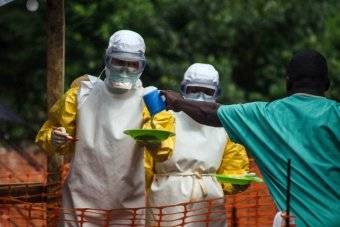State of Emergency Declared Amidst Worst Ebola Outbreak in History
Ebola outbreak: Sierra Leone declares state of emergency as death toll climbs to almost 730
Sierra Leone has declared a state of emergency as authorities struggle to contain the Ebola virus pandemic in west Africa, with the death toll now climbing to almost 730.
The country’s president says all epicentres of the disease will be quarantined, enforced by the police and the military.
Sierra Leone has also joined Liberia in restricting public gatherings, with all deaths required to be reported to the authorities, while several other African countries have announced measures to screen travellers at border posts.
The new measures come as the leader of the World Health Organisation prepares to meet in Guinea with presidents of the affected countries to launch a $100 million emergency joint response plan.
According to the WHO, another 57 people have now died in west Africa, pushing the overall death toll from the epidemic to 729.
“The scale of the Ebola outbreak” requires the WHO, Guinea, Liberia and Sierra Leone “to take the response to a new level,” WHO director-general Margaret Chan said in a statement ahead of Friday’s meeting.
It is the worst-ever outbreak of the virus, which often causes fatal bleeding and has no vaccine. There are now fears it could spread beyond west Africa.
Cancelling a planned trip to the US-Africa summit in Washington, Sierra Leone president Ernest Bai Koroma made a televised address to his country warning the disease poses an extraordinary challenge to the nation.
“Sierra Leone is in a great fight … failure is not an option,” Mr Koroma said in a speech late Wednesday.
Announcing the state of emergency will initially last between 60 and 90 days he added: “Extraordinary challenges require extraordinary measures.”
The 57 new Ebola deaths were recorded between Thursday and Sunday last week in Guinea, Liberia, Nigeria and Sierra Leone, the WHO said in a statement.
The UN health agency said 122 new cases were detected over those four days, taking the total number of confirmed and likely infected cases from the outbreak so far to 1,323.
US aid worker to be transferred home
A US aid worker infected with deadly Ebola virus is returning to the United States to be treated in a high-security ward at Emory University Hospital in Atlanta, hospital officials said.
The aid worker, whose name has not been released, will be moved in the next several days to a special isolation unit set up in collaboration with the US Centre for Disease Control and Prevention (CDC), one of only four in the United States.
CDC spokeswoman Barbara Reynolds says the CDC is not aware of any Ebola patient ever being treated in the United States.
News of the transfer follows reports of the declining health of two infected US aid workers, Dr Kent Brantly and missionary Nancy Writebol who were both described as being in a “stable but grave condition”.
A spokeswoman for the relief organisations Dr Brantly and Ms Writebol were serving with could not confirm whether the patient being transferred back to the US was on the two workers.
“Even though her condition has worsened, we know she is receiving the best possible medical care, and we are thankful that she has access to this experimental drug,” SIM USA president Bruce Johnson said.
Dr Brantly, 33, has received a unit of blood from a 14-year-old boy who survived Ebola with the help of Mr Brantley’s care, according to Samaritan’s Purse’s Franklin Graham.
“The young boy and his family wanted to be able to help the doctor who saved his life,” Mr Graham said.
News of the transfer comes as reports emerge that the US government will begin human testing on an experimental Ebola vaccine as early as September, after seeing encouraging results from tests on primates.
Ongoing risk of transmission
The WHO said the trend in Guinea, Liberia and Sierra Leone “remains precarious with ongoing … transmission of infection”.
Guinea is suffering the worst from the disease. In the last four days of last week the country’s authorities reported 20 more deaths apparently from Ebola, taking its national fatality figure to 339.
Liberia suffered another 27 more deaths, taking their national death toll to 156. Sierra Leone reported a further nine deaths brining their total death count to 233. Nigeria, Africa’s most populous country also reported its first death.
.
However the WHO said the medical sample taken from the patient who died in Nigeria shortly after arriving by air had still not been analysed by its regional lab because courier companies were refusing to transport it.
The agency added that it “does not recommend any travel or trade restrictions” be applied to Guinea, Liberia, Nigeria, or Sierra Leone at this time.
Despite the WHO’s stance, the US Centre for Disease Control and Prevention has issued a travel advisory against non-essential travel to Guinea, Liberia and Sierra Leone to help curb the spread of the virus.
The advisory aims to prevent visitors from being exposed to Ebola in local health facilities should they need medical attention for other ailments, the centre’s Dr Thomas Frieden said.
In a measure of rising international concern, on Wednesday Britain held a government meeting on Ebola, warning the disease poses a threat it needs to respond to.
The US Peace Corps said it was withdrawing 340 volunteers from Liberia, Sierra Leone and Guinea after two of them came in contact with a person who later died of the virus.
But the International Airlines Association (IATA) has said the WHO was not recommending any travel restrictions or border closures and there would be a low risk to other passengers if an Ebola patient flew.
 The Global Calcuttan Magazine
The Global Calcuttan Magazine 